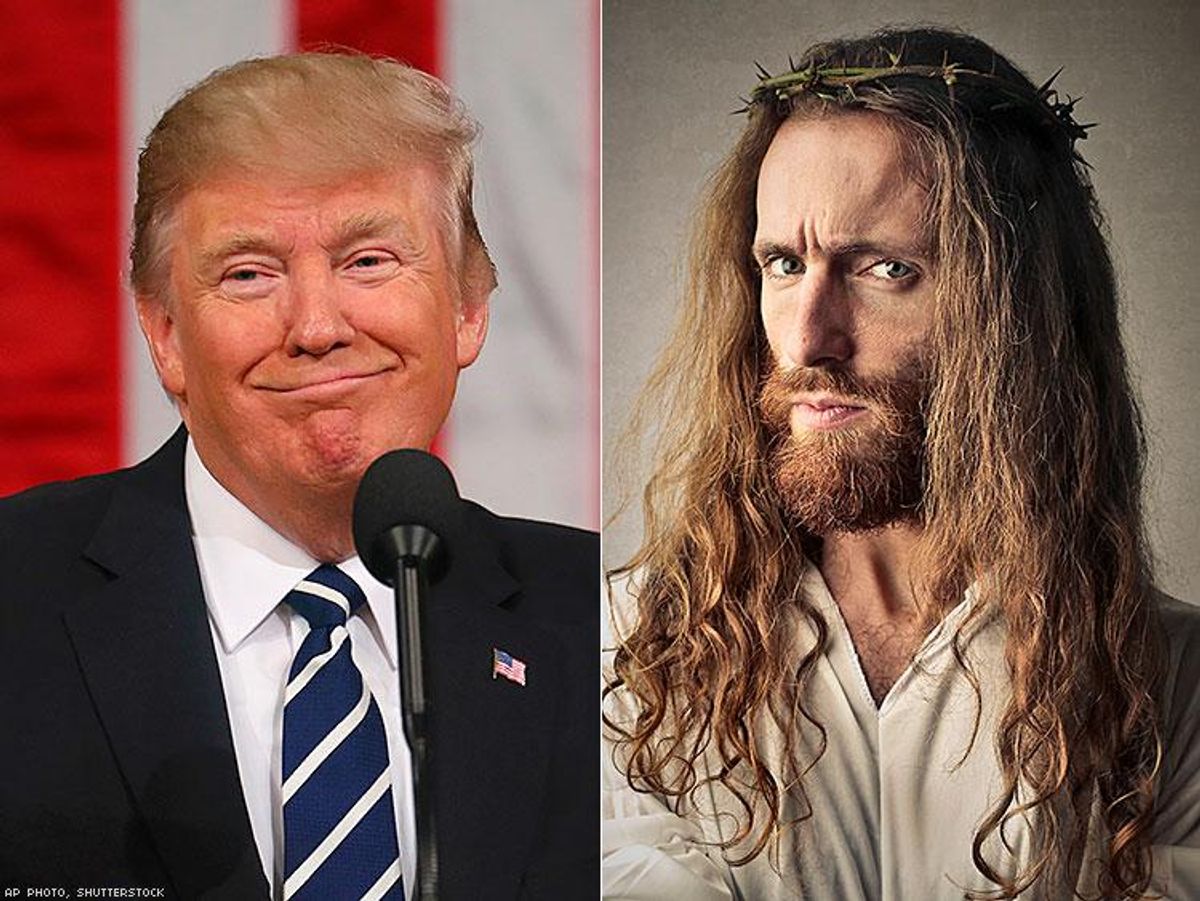Donald Trump quoted the Bible once during his speech to Congress on Tuesday, and it has me worried.
Trump didn't quote some bit player in Christianity. He invoked the words of none other than Jesus Christ. Trump used the prince of peace to advocate war, specifically for his mission in Yemen.
For Christians, a quote like that ought to come with a high bar for usage. But Trump's dip into "just war" theory is getting frighteningly little consideration.
It happened as an aside during the moment that made political pundits swoon; they adore political theater, and this time Trump stage-managed a doozy. Trump asked the wife of a slain Navy SEAL to stand. The audience at the joint session of Congress applauded as Carryn Owens looked up to the sky with tears falling down her cheeks, hands clasped prayerfully. Her husband, Ryan, was killed during Trump's first military operation -- which by all accounts was botched.
Americans instinctively and passionately support the families of those who've given their lives to protect us. Loyalty is part of who we are.
Trump famously miscalculated that allegiance during the campaign when he attacked the Khans, a Muslim family who lost their son, who was killed in a suicide attack in Iraq. You can oppose the war in Iraq and still support the Khans and the service of their son, Army Captain Humayun Khan. You can also doubt that Trump's ordered mission in Yemen was moral while believing Ryan was motivated to service by love of fellow Americans.
When on Tuesday the deafening applause for Navy SEAL Owens subsided, Trump said rather poetically that "Ryan's legacy is etched into eternity."
It was a rare spate of soaring rhetoric for a president who usually punctuates with "Sad!" Pundits awed, not realizing the standard for what's presidential has been so debased by Trump's tweets that the next line -- which is orders of magnitude more consequential -- was overshadowed.
"For as the Bible teaches us," added Trump, "there is no greater act of love than to lay down one's life for one's friends."
Yes, Mr. President, the Bible includes those words. But they're not to be invoked impulsively. Soldiers say the line -- John 15:13 -- has inspired them through military assignments, or has been tatooed on their bodies, or that it's been read at memorial services. Even police officers or firefighters look to it as inspiration when risking their lives for ours.
No one should want war. Those who agitate for wars get cast by history into the evil column in our recurring struggles of good versus evil. But when good men and women find themselves in war, confronted with questions about whether it's moral to kill another human being, or whether it's moral to order others into battle knowing many will die, some look to religion for assurance they haven't strayed from their principles.
This verse, John 15:13, comes as Jesus is speaking to his disciples on the night before he will be arrested, and eventually beaten and dragged through town, ultimately crucified. He is delivering last words of insight, knowing the end is near. Arguably this is his most important lesson. He is naming the utmost form of love.
"This is my commandment," says Jesus, according to the King James version, "That ye love one another, as I have loved you." That's what Jesus says one sentence before the line quoted by Trump. "Greater love hath no man than this, that a man lay down his life for his friends."
To lay down your life, as Jesus is discussing, isn't that each of us should be hung on a cross and left to die. It isn't literally about dying for your country in war either. He's Jesus; he speaks in parables. They're intended for our appropriation into our daily deliberation of life's moral quandaries. LGBT people aren't explicitly mentioned in the Bible in terms we'd recognize today, but that doesn't stop its verses from being thrown into debate over our lives. So fine, use the Bible to argue over war. Good people ought to debate which conflict is and is not a "just war."
A pacifist, perhaps including Jesus, would never justify any war. Jesus was not doing that when he made these comments. And it's worth stopping for a moment to consider the actual context. Many reads of the Bible say Jesus was saying the highest form of love is to dedicate your life to service of others, calling for a mutual love that knows no selfishness -- which is a lesson Trump needs. He'd do well to read more about the scripture he's quoting. What would happen if our president applied this verse to other policies?
Trump, after all, has spent his presidency preaching the value of "America First." Each speech is a sermon on selfishness, and he once again on Tuesday suggested that Americans will get more if everyone else gets less. That's not in tune, for example, with Jesus Christ commanding his disciples to give up their last five loaves of bread and two fish to feed the multitude. Jesus Christ spent every day with the assumption of abundance, not scarcity.
Jesus Christ doesn't share the Trump approach to foreign or domestic policy. So it ought to be a red flag whenever Trump quotes him. What worries me is that Trump breezed by justifying his Yemen operation and instead jumped to the conclusion. It's like mumbling through the facts just to blurt out "and they all lived happily ever after."
There are important, outstanding questions. Even Ryan Owens's father is asking for answers. Bill Owens told the Miami Herald that when his son's body arrived back in the United States, he refused to meet Trump and be faced with shaking the president's hand.
It's not for any of us to say what a grieving parent should do in any situation. Even if a mission was justified, it would be understandable for a mourning parent to opt out of shaking the president's hand. It's also respectful for the president to have gone to the airport to mark the moment.
But Bill Owens told the Herald, "I want an investigation. The government owes my son an investigation."
I don't know how Bill Owens reacted as the country applauded his son on Tuesday. Earlier, he'd told Trump, via the Herald: "Don't hide behind my son's death to prevent an investigation."
Bill Owens wants to know why Trump ordered any mission with only a week under his belt as president. He wants to know why it was so urgent, especially because there had been no troops in Yemen during the Obama administration, leaving the killing to drones and missiles.
On Tuesday, Trump reiterated a claim that Navy SEAL Team 6 had returned "large amounts of vital intelligence that will lead to many more victories in the future against our enemies." Leaks in his own administration dispute that claim. "Multiple senior officials" told NBC News that Trump's wrong, there is no evidence of any pivotal intelligence being captured.
Any mission that is ordered over dinner instead of from the Situation Room makes me suspicious. And that's literally what happened in this case, according to The New York Times. Trump was reportedly eating dinner at the White House with Steve Bannon, his son-in-law Jared Kushner, and two generals -- Joseph Dunford and Defense Secretary Jim Mattis -- when he green lit the strike.
We're not yet finished with the first 100 days of Trump's presidency. Let's be realistic: There will be more raids to come, more servicemembers killed, and civilian casualties are a fact of all armed conflict. No matter what happens next, Trump shouldn't be allowed to cite God or Jesus Christ, or Buddha, or Muhammad, or any deity, as a substitute for explaining decisions he makes. Trump is human, not God, and when he orders Americans into danger it is not inherently good.
I want to know what justification Trump has for the more than 25 civilians killed during the Yemen raid, including women and children. Reports say as many as nine children under the age of 13 are dead. That list includes an 8-year-old American girl, Nora al-Awlaki, who is the daughter of a terrorist.
During the campaign, Trump promised he would kill the families of terrorists. Is that what was happening here? We don't know. All we know is this story about the intelligence bounty is so far just that -- a story. Trump has more explaining to do, especially if he wants to claim Jesus Christ is cosigning with the consequences.
 LUCAS GRINDLEY is the editor in chief of The Advocate. Follow him on Twitter @lucasgrindley or on Facebook.
LUCAS GRINDLEY is the editor in chief of The Advocate. Follow him on Twitter @lucasgrindley or on Facebook.


 LUCAS GRINDLEY is the editor in chief of The Advocate. Follow him on Twitter
LUCAS GRINDLEY is the editor in chief of The Advocate. Follow him on Twitter 










































































